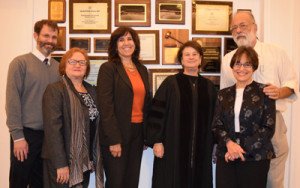SWLAW Blog | Campus

January 22, 2016
New Intersession Course Explores How to Legally Protect the Elderly
During the first week of January, Southwestern Law School offered a unique, new intersession course, Medical/Legal Aspects of Older Adults - Capacity, Undue Influence, and Abuse, which focused on critical legal issues related to the elderly.
The purpose of the class was to help students gain a basic understanding of the issues that the elderly face and greater knowledge and expertise in addressing issues of testamentary capacity (a person's legal and mental ability to make/change a will) and vulnerability to undue influence. Development of this course was a collaboration between Southwestern, the Los Angeles County Department of Mental Health (LACDMH), Bet Tzedek Legal Services, UCLA Geropsychiatry, attorney Stewart Levin and retired Judge Aviva K. Bobb.
The course provided the following:
- An overview of key issues in elder law from the perspective of physicians and lawyers, along with sensitivity training in dealing with the elderly.
- Recognition of capacity issues through the use of a case file and video of a testator who is the subject of a will contest;
- Preparation and analysis of a Medical Declaration of Capacity; and
- Development of trial skills for the law student and greater expertise in testifying as an expert witness by the psychiatrists.
The 14-hour course, spread out over four days, was open to Southwestern students and practicing psychiatrists. The class was taught by Dr. Sarah Gelberd, Medical Director, Los Angeles County Department of Mental Health (LACDMH) Older Adult System of Care (OASOC); Janet Morris, a senior attorney at Bet Tzedek Legal Services specializing in Elder Law; Stewart Levin, an experienced litigator specializing in elder law and abuse; Dr. Aaron Kaufman and Dr. Stephen Read, Geriatric Psychiatrists and faculty members at UCLA; and Judge Aviva Bobb, now retired and the former presiding Judge of Los Angeles County Probate Court.
Harriet M. Rolnick, Associate Dean of Southwestern’s SCALE program was instrumental in the planning and execution of this new course.
"The elderly will be a significant part of the U.S. population and are particularly susceptible to issues of capacity, abuse, neglect, scams and fraud as they age," Associate Dean Rolnick said. "It was very rewarding to be involved in the planning and execution of a new course addressing some of these critical issues affecting the elderly. The Intersession course offered at Southwestern on the Medical/Legal aspects of Older Adults represented a true collaboration between doctors and lawyers, psychiatrists seeking further training, and law students. The exchange of ideas and expertise in the creation and delivery of this course provided a wonderful opportunity for all parties to learn and grow from each other’s expertise and unique perspectives and will no doubt benefit the elderly in our communities."
Fourth-year evening student Alenoush Aslanyan took this course because she plans to practice elder care law and healthcare law after she graduates from Southwestern in May. "Through this course, I learned how crucial it is for attorneys and medical professionals to work together and have a mutual understanding of each other's goals when dealing with a legal issue concerning an elderly person," she said. "Also, being able to effectively communicate with each other accurately through an understanding of each other's terms of art and language is critical. Both of these were clearly demonstrated in our practice case, and I found them to be the most compelling part of the course."
Dr. Taya Varteresian, a psychiatrist who also took intersession course, said, "I am very impressed and pleased with the Elder Law class at Southwestern Law School. The experiential learning was memorable and interesting. I also liked working in a multidisciplinary setting and meeting the law students as it gave me insights into the different orientations we have in helping clients. After taking this course, when I am asked to be involved in legal matters with my patients, I will be more prepared to provide effective testimony."